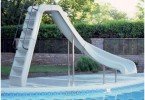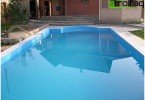Pool Tile
Currently, the pool is not a luxury, but an integral element of most country houses. Only a few years ago it was possible to swim in the pool in sports complexes, hotels, and now – in one form or another, many homeowners have it. Undoubtedly, such artificial ponds must meet a number of requirements, including aesthetic appearance. For this, a variety of facing pool finishes. Most often, pool tiles are used for these purposes..
Content
- Pool Finishing Material Requirements
- Types of special tiles
- Technological rules for facing ceramic pools
Pool Finishing Material Requirements
When selecting tiles for finishing the pool, a number of rules should be followed. So, the facing material must meet certain requirements that arise in connection with the specifics of the structure. The main criteria for choosing tiles in general terms can be considered operational comfort and attractive appearance.
Comfort in use implies excellent material characteristics that allow it to be used for many years. One of the most important characteristics is considered to be the degree of water absorption. The tile intended for facing for pools should have the minimum water absorption. Otherwise, the material, which is constantly in the water, would begin to absorb moisture and lose its attractive appearance, operational properties.
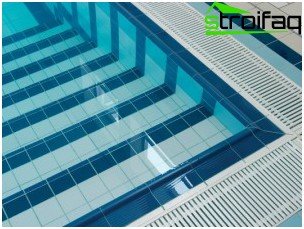
Pool tiles combine technical and aesthetic benefits
Another requirement that tiles for pool lining must meet is its strength. It must withstand the enormous load created by the thickness of the water in the pool bowl. In this case, the quality of the tile determines not only the durability of the finish of the hydraulic structure, but also the safety during its operation.
The third requirement that the tile for the pool must comply with is the absence of even minimal pores and voids in it. The fact is that with their presence and under the constant destructive action of moisture, the material will begin to erode. In addition, voids are a great place for the reproduction of bacteria and microorganisms. This contributes to the appearance of mucus on the walls of the pool, which is not only unhygienic, but also dangerous. Thus, the tiles for the pool – photos of various samples can be found on the Internet or in any hardware store – should also have a non-slip effect.
Among other things, tiles should be easy to clean and maintain. It is for this reason that it is recommended to choose a facing material without roughness and roughness. If the tiles for the outdoor pool or its closed analogue are smooth, this will significantly save money, time and nerves that will be spent on cleaning the pool.
Types of special tiles
To date, there are several classifications of tiles for pools, each of which is carried out on the basis of different criteria. So, facing material can be used for finishing outdoor or indoor pools. In addition, the tile can be divided depending on the place of its installation: tile for the walls of the pool, for the floor, for steps.
As a rule, the pool is lined with tiles according to European standards, according to which it is customary to divide the tiles into several classes, depending on the anti-slip properties.
- A class. This is a tile, the main purpose of which is to finish the utility rooms of the pool.
- B class. Such a facing tile is suitable for designing a descent into the pool and finishing the bottom of its bowl.
- C class. This tile is most often trimmed steps for descent..
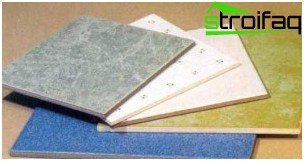
Types of tiles for swimming pools
In addition, finishing the pool with tiles requires a careful approach to the surface of the product. So, the tile can have a rough or smooth surface, in addition, it can be matte, semi-gloss and glossy. Especially spectacular is the mosaic tile, with which the decoration of the pool bowl can be a real work of art.
The most popular tile was “glazed clinker”. This is due to the fact that the degree of its water absorption is only 3%, and the surface covered with glaze allows you to ensure the absence of the smallest pores in the tile.
Technological rules for facing ceramic pools
So, laying tiles in the pool is carried out using special means, which should also differ in a number of features, which is associated with the operation of tiles in the aquatic environment. That is why it is important to correctly choose the glue for the facing material. It must be frost-resistant, flexible and moisture resistant..
The adhesive intended for the installation of tile material may be different. His choice depends on many factors, in particular, on the characteristics of the tile itself. Apply glue to the pool tiles using a special notched trowel on a previously laid waterproofing layer.
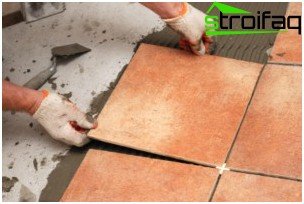
Laying tiles in the pool requires the use of special bonding materials
The amount of glue applied should allow you to adjust the position of the tile when it is applied. The pressure on the tile during laying should be strong enough to ensure its reliable adhesion to the base. Properly selected adhesive for tiles in the pool will ensure its attractive appearance for many years. In addition, reliable fastening of the facing material will provide the proper degree of safety during the operation of the pool. It is worth noting that the aesthetic appearance of the hydraulic structure helps to give grout for tiles in the pool. As a rule, it is matched to the tone of the facing material..
Thus, ceramic tile is an ideal material for pool lining. It is durable, practical and has an aesthetic appearance that will delight the eye not only of the owner of the house, but also of his guests.


